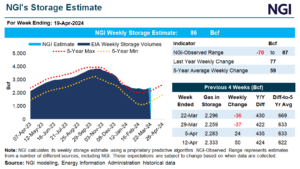LNG | LNG Insight | NGI All News Access | NGI The Weekly Gas Market Report
NextDecade’s Proposed South Texas LNG Project Smaller, Less Polluting
In a win-win for NextDecade Corp., the technology adopted by the developer for its proposed Rio Grande liquefied natural gas (RGLNG) project in South Texas is to be capable of producing more super-chilled fuel with lower emissions.

With the technology, the footprint of the 27 million metric tons/year project would be reduced to five production units, versus the six that were originally proposed, according to NextDecade, which is headquartered in Houston*. Notably, removing one train given the improved technology would result in a 21% reduction in carbon dioxide equivalent emissions, versus the original design.
NextDecade also expects a reduced construction timeline and less roadway traffic, which management said demonstrates its “ongoing commitments to the community in the Rio Grande Valley.”
Throughout the course of its pre-final investment decision (FID) development activities, NextDecade has worked to reduce the environmental impacts of RGLNG,” said CEO Matt Schatzman.
The coronavirus pandemic has pushed back the FID to build the project near the Texas-Mexico border into 2021. The company was expected to sanction the facility earlier this year; it is to be sited on a 984-acre site in the Port of Brownsville.
NextDecade has indicated that it has enough capital to operate until the end of next year, including a $50 million investment from Abu Dhabi-based sovereign investor Mubadala Investment Co. However, the delayed FID prompted additional steps to cut costs, including a reduction in the full-time staff and some furloughs for the remaining workforce. The company also has agreed with Bechtel Corp. to limit engineering work, with plans to cut leased office space and defer other administrative spending.
NextDecade plans to vacate Train 6 because of the optimizations and indicated that if it were to develop another train, it would require authorization from the Federal Energy Regulatory Commission, the Department of Energy and other relevant regulators.
*Correction: In the original version of this story, the location of NextDecade’s headquarters was incorrectly reported. NGI regrets the error.
© 2024 Natural Gas Intelligence. All rights reserved.
ISSN © 1532-1231 | ISSN © 2577-9877 | ISSN © 1532-1266 |


